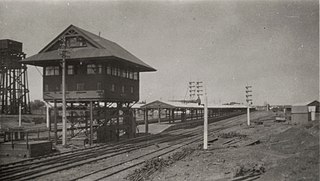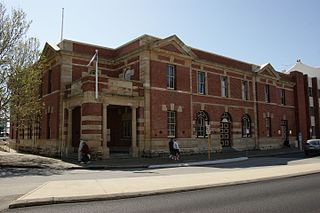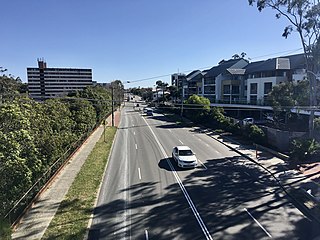Related Research Articles

Mount Lawley is an inner northern suburb of Perth, Western Australia. The suburb is bounded by the Swan River to the east, Vincent, Harold and Pakenham Streets to the south, Central Avenue and Alexander Drive to the north, and Norfolk Street to the west.

Leonora is a town in the Goldfields-Esperance region of Western Australia, located 833 kilometres (518 mi) northeast of the state capital, Perth, and 237 kilometres (147 mi) north of the city of Kalgoorlie.

Wagin is a town and shire in the Wheatbelt region of Western Australia, approximately 225 km (139.81 mi) south-east of Perth on the Great Southern Highway between Narrogin and Katanning. It is also on State Route 107. The main industries are wheat and sheep farming.

Albany Highway links Western Australia's capital city Perth with its oldest settlement, Albany, on the state's south coast. The 405-kilometre-long (252 mi) highway travels through the southern Wheatbelt and Great Southern regions, and is designated State Route 30 for most of its length. Outside of Perth the highway is predominately a sealed, single carriageway with regular overtaking lanes in some undulating areas. Albany Highway commences at The Causeway, a river crossing that connects to Perth's central business district. The highway heads south-east through Perth's metropolitan region, bypassed in part by Shepperton Road and Kenwick Link, and continues south-eastwards through to Albany. It intersects several major roads in Perth, including the Leach, Tonkin, Brookton, and South Western highways. The rural section of Albany Highway connects to important regional roads at the few towns and roadhouses along the route, including Coalfields Highway at Arthur River, Great Southern Highway at Cranbrook, and Muirs Highway at Mount Barker.

Swanbourne is a western coastal suburb of Perth, Western Australia, located within the City of Nedlands. It is an affluent, upper middle class residential area with older Federation style homes, many being renovated. The suburb was established in the late 19th century. New housing estates have been built recently through the redevelopment of areas such as the Swanbourne Senior High School, Swanbourne Primary School and Lakeway Drive-In Cinema sites.

ABC Radio Perth is the on-air identifier of a radio station located in Perth, Western Australia, operated by the Australian Broadcasting Corporation, and broadcasting at 720 kHz AM. It is the flagship ABC Local Radio station in Western Australia. The station was established under the Sealed Set scheme by Westralian Farmers in 1924, sold to the Commonwealth Government in 1928 and provided with programmes by the Australian Broadcasting Company, became part of the Australian Broadcasting Commission in 1932, which became the Australian Broadcasting Corporation in 1983.

South Fremantle is a suburb of Perth, Western Australia, located within the City of Fremantle.

Crawley is an affluent western suburb of Perth, the capital city of Western Australia. Whole area is part of the local government area of the City of Perth and previously shared between the City of Subiaco and City of Perth. It is about 5.8 kilometres (4 mi) from the Perth CBD via Mounts Bay Road.

A coffee palace was an often large and elaborate residential hotel that did not serve alcohol, most of which were built in Australia in the late 19th century.

Dorrien Gardens is a sports ground in West Perth, Western Australia primarily used for soccer. It is the home ground of Perth SC.

Kalgoorlie railway station is the easternmost attended station in Western Australia, located at the eastern terminus of the Eastern Goldfields Railway. It serves the city of Kalgoorlie. Beyond Kalgoorlie, the line continues east as the Trans-Australian Railway.

The Old Customs House is a building in Fremantle, Western Australia that was built in 1908 to house the main branch of the Customs Department of Western Australia. It is one of only a handful of extant Customs Houses in the state; others are in Albany, Broome, Cossack, and Geraldton.

Guildford Road is a major road in Perth, Western Australia, linking the inner-city suburb of Mount Lawley with Guildford in the north-east. The ten-kilometre-long (6.2 mi) road runs mostly parallel to the Swan River, on its northern side, and is part of State Route 51, which runs between Perth's CBD and Midvale. Guildford Road is maintained and controlled by Main Roads Western Australia, which uses the internal designation "H026 Guildford Road" for Guildford Road, as well as Bridge Street and James Street in Guildford. In the 1930s, the name Great Eastern Highway was coined to describe the road, but was actually used for the road on the other side of the Swan River.
The Coolgardie Miner was a weekly newspaper established in Coolgardie, Western Australia, at a time when Coolgardie was the prominent town in the goldfields region of Western Australia.

The Mundaring Hotel was opened in 1899 in Mundaring, a hills suburb of Perth, Western Australia.
Erskine Link, once known as Bay Street, is situated in East Perth between Hay Street and Adelaide Terrace.
References
- ↑ "Historical Suburb Names". Landgate, Government of WA.
- 1 2 3 4 "Perth Street Names". The West Australian . Vol. XLVII, no. 8, 900. Western Australia. 1 January 1931. p. 8. Retrieved 17 May 2018– via National Library of Australia.
- 1 2 3 4 5 6 7 8 9 10 11 12 "Perth For Everyone: Perth's City Street Names". Perth for Everyone, 2011. 22 February 2014. Archived from the original on 22 February 2014. Retrieved 17 May 2018.
- 1 2 3 4 5 6 7 8 9 10 "Perth Streets". Sunday Times (Perth) . No. 1645. Western Australia. 4 August 1929. p. 12 (Second Section). Retrieved 17 May 2018– via National Library of Australia.
- ↑ "Post Office Directories | State Library". slwa.wa.gov.au. State Library of WA. Retrieved 17 May 2018.
- 1 2 3 4 "Streets of Perth". Western Mail . Vol. XLII, no. 2, 178. Western Australia. 10 November 1927. p. 2. Retrieved 17 May 2018– via National Library of Australia.
- ↑ "MUNICIPAL COUNCILS". Daily News. 29 August 1905. Retrieved 2 June 2023.
- ↑ Aboriginal place names : Mooro, Beeliar tribal territories : pre-European settlement, 1997, retrieved 6 September 2021|
- ↑ "Street Names Tell Perth's History". Daily News . Vol. LV, no. 18, 837. Western Australia. 3 August 1935. p. 18 (LATE CITY). Retrieved 17 May 2018– via National Library of Australia.